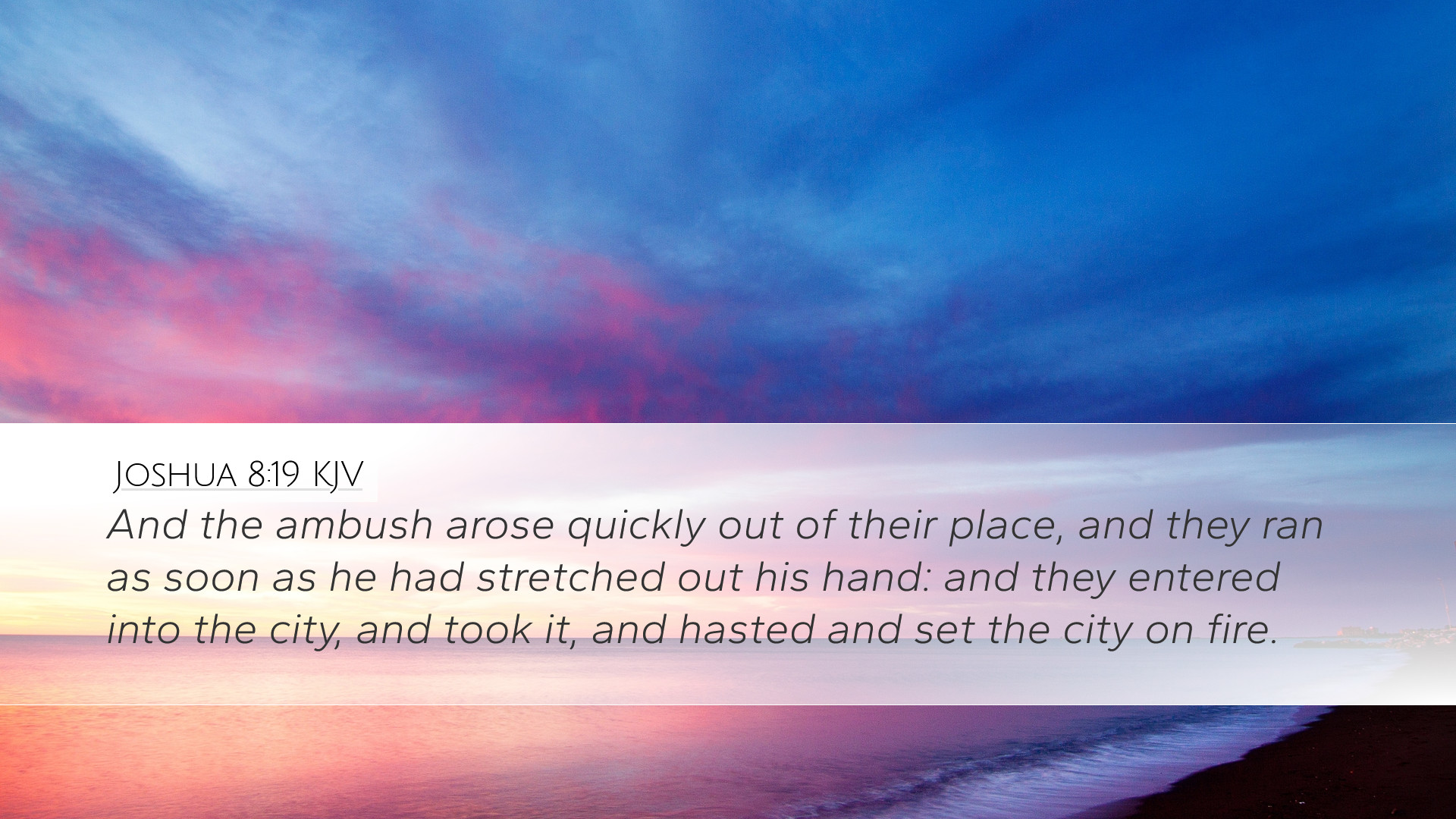Commentary on Joshua 8:19
Verse: "And the ambush arose quickly out of their place, and they ran as soon as they had stretched out their hands; and they entered into the city, and took it, and hasted and set the city on fire."
Introduction
This passage from Joshua 8:19 encapsulates a significant moment in the conquest of Ai, highlighting the strategic military tactics employed by the Israelites under Joshua’s leadership. The ambush strategy reveals both divine guidance and the importance of obedience among God's people.
Context of the Passage
Having suffered a setback at Ai due to Achan's sin (Joshua 7), Joshua learned the importance of adhering to God’s commands. After atoning for this sin, Joshua prepares to attack Ai again, this time with a different strategy involving a diversionary ambush against the city.
Historical Context
- The city of Ai is a significant foe that the Israelites must conquer to claim the Promised Land.
- God's initial command was to capture the city, indicating the necessity of planning coupled with divine intervention.
Commentary Insights
Matthew Henry's Commentary
Matthew Henry emphasizes the swiftness of the ambush's execution. He notes, "The readiness of the ambush reflects the obedience and zeal of the Israelites." Henry highlights that quickness in action is often rewarded when such actions are aligned with divine directives.
Albert Barnes' Notes
Barnes points out that the ambush signifies not just a tactical display but also reflects a reliance on God's promises. He states, "The enterprising spirit of the men in the ambush demonstrates the faith that they had in God's promise to deliver the city into their hands." This reliance indicates that faith is paired with action.
Adam Clarke’s Commentary
Adam Clarke views the incident through the lens of divine providence, affirming that God had orchestrated the circumstances for victory. Clarke articulates, "The fire that consumed Ai symbolizes God's judgment upon disobedience and a powerful reminder of His authority over nations." Clarke’s perspective brings forth the theological significance of God's justice, balanced with His mercy towards the repentant.
Theological Implications
The account of Joshua 8:19 teaches several vital theological lessons:
- Divine Sovereignty: The event underscores God's ultimate control over the affairs of nations and emphasizes that victory is available through divine support.
- Obedience: Joshua's strategic plan is an example of how obedience to God leads not only to success but also to fulfillment of His promises.
- Judgment and Mercy: The destruction of Ai reflects God's holiness and the seriousness of sin, juxtaposed with His readiness to forgive and lead His people into victory.
Application for Pastors and Theologians
For pastors and theologians, Joshua 8:19 serves as a reminder of the importance of prayerful planning in ministry:
- Courage in Adversity: Just as Joshua faced challenges, ministers are encouraged to remain steadfast and trust in God's guidance.
- Community Engagement: The swift action of the ambush highlights the need for unity and collaboration among church members to achieve God-given objectives.
- Spiritual Warfare: The instance encourages modern believers to view life through the lens of spiritual warfare, relying on God for victory over sin and systemic evil.
Conclusion
Joshua 8:19 is rich in its depiction of leadership, divine guidance, and strategic action. It serves as a powerful reminder of the need for preparation, faith, obedience, and community in the life of believers. Pastors, theologians, and students of the Bible can draw profound insights from this passage, applying its lessons to the challenges faced in today’s world.


